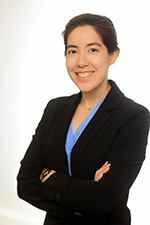Delving into the Data
Kate Yee’s summer internship with AbbVie was the next step in a transition to a career in healthcare analytics.
Kate Yee (MLDS ‘24) wants a future in healthcare analytics. Their summer internship was a big step toward making that possible.
Yee is a student in Northwestern Engineering's Master of Science in Machine Learning and Data Science (MLDS) program (formerly the MSiA program). This summer, they worked as a marketing analytics and business insights intern at pharmaceutical company AbbVie.

Yee’s summer duties involved developing a machine learning program to spot strange patterns or sudden shifts in data tracked over time. With AbbVie, this can help detect important anomalies within the markets of the pharmaceuticals being developed. Yee also made a web application that displayed these patterns so company decision-makers could see them more clearly.
This healthcare-adjacent summer internship was a valuable reward for Yee, who wanted to transition into the field for some time. Yee earned their bachelor’s degree in humanities and engineering in 2020 and served as a consultant for the next three years with Secunetics, an IT engineering firm specializing in infrastructure intelligence.
In the back of their mind, however, Yee soon began to think about a future in healthcare.
That led Yee to the MLDS program. They said they were impressed by the program’s focus on practical experience through internships and practicums.
Yee said healthcare is a space overflowing with exactly what they are most into — data.
“There’s a huge amount of data associated with every single thing we do with our bodies,” they said. “But data privacy is a legitimate concern. People might love tracking their steps, sleep, and other health-related topics with wearable technology, but how that data is used and by whom is an area of immense concern."
That makes data anonymization vital to both Yee’s future and the future of the healthcare industry.
“While there are so many potential problems with data de-identification and making sure that private information can't be traced back to individuals, the data itself has created a very wide opening for finding different pathways to improve the discovery of what ails people," Yee said, "and more importantly, how to make them healthier.”
That future hope gives Yee focus and purpose. They said their goal is to take the volumes of data being gathered through things such as wearable healthcare devices and use it to help close the life expectancy gap between the United States and similarly developed nations.
In 2022, the Centers for Disease Control and Prevention estimated life expectancy in the United States to be 77.5 years, while in comparable countries that number stood at 82.2 years.
“The United States is such a wealthy nation per capita, but our life expectancy is so much lower than other countries,” they said. “Especially in the context of how healthcare is provided to people, how can we better optimize those pathways within our hospital systems and insurance systems?”
Yee wants to provide the answers to those questions.
“I would really love to be able to work in the optimization side of healthcare, to come up with different types of programming to make systems more accessible and more effective for patients,” Yee said. “Do I know exactly how to get there right now? No. But I know I’m in the right place to learn.”

